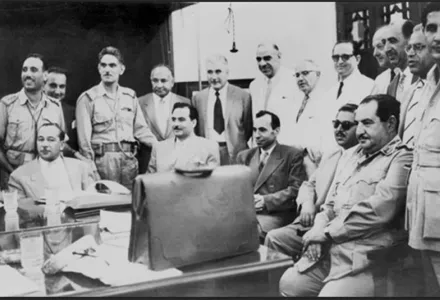Dr. Jeffrey G. Karam is a Postdoctoral Research Fellow in the International Security Program at the Belfer Center for Science and International Affairs at the Harvard Kennedy School. Dr. Karam also teaches courses on International Relations, Security Studies, Politics of the Middle East, and Wars, Revolutions, and Coups in the Middle East and North Africa at the Pardee School of Global Studies at Boston University. Trained as an interdisciplinary Political Scientist in Lebanon and the United States, Dr. Karam relies extensively on primary documents in multiple languages and builds on existing International Relations and Security Studies theories to analyze historical and contemporary case studies of American Intelligence and Foreign Policy in the Middle East.
Dr. Karam is currently completing a book manuscript on the relationship between American intelligence and foreign policy in the Middle East during the Cold War. His book draws on hundreds of recently declassified and untapped American and British intelligence records, diplomatic cables, and memoranda of conversations from the U.S. National Archives, the Eisenhower Presidential Library, the Library of Congress, the U.K. National Archives, and the British Library. Fluent in Arabic and French, Dr. Karam has also conducted fieldwork throughout the Middle East and extensive archival research in multilingual documents at different archives, libraries, and organizations in Lebanon and Jordan. Dr. Karam has likewise interviewed dozens of Arab intelligence officials, military officers, diplomats, politicians, and scholars in the Middle East. His research has been supported by several organizations including the Andrew W. Mellon Foundation, the Belfer Center for Science and International Affairs at Harvard University, the Crown Center for Middle East Studies at Brandeis University, the Elliott School of International Affairs at George Washington University, and the Issam Fares Institute for Public Policy and International Affairs at the American University of Beirut. Recently, Dr. Karam’s article “Missing Revolution: The American Intelligence Failure in Iraq, 1958” was published in Intelligence and National Security. He has also published book chapters and reviews of recent scholarly works in the field of intelligence studies and security studies in several leading peer-reviewed journals. Dr. Karam has organized and been invited to serve as chair and discussant on panels focused on topics in intelligence studies at the annual meetings of the American Political Science Association, International Studies Association, and Middle East Studies Association.
Dr. Karam holds a Ph.D. in Politics from Brandeis University, an M.A. in Political Studies from the American University of Beirut, and a dual B.A. in International Affairs and Diplomacy from the Notre Dame University, Louaize. To know more about his work, please visit Dr. Karam’s LinkedIn page and follow him on Twitter @JGKaram.




